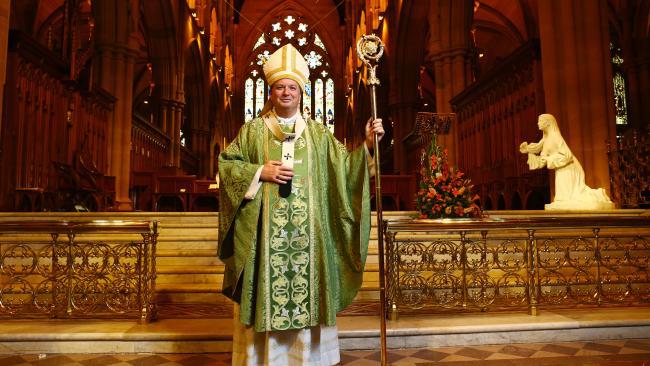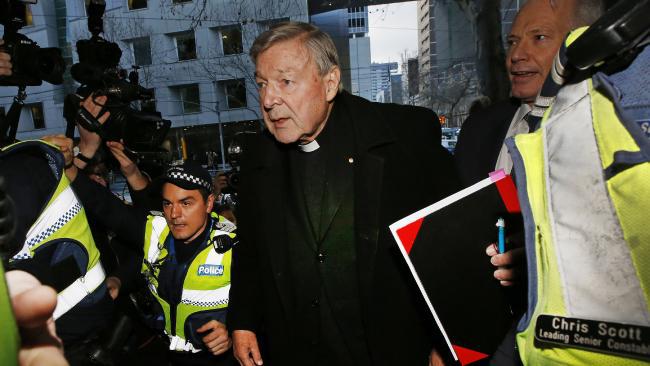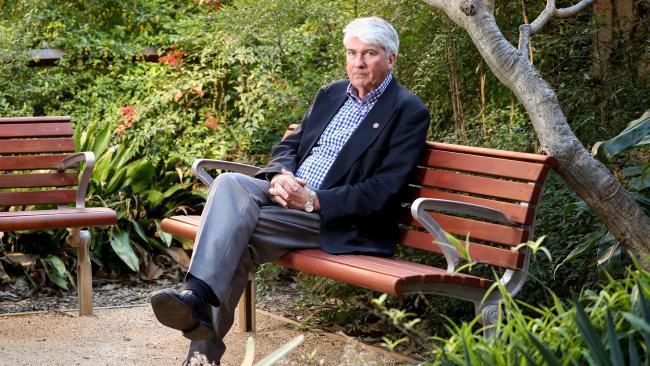|
Besieged Catholic Church is wounded, but will not fall
By Greg Craven
Have things ever seemed worse for the Catholic Church in Australia? If it were a boxer, it would look tangled in the ropes, sliding towards the canvas and spitting blood. The past four years have been horrendous. Endless, horrifying accounts of historical child abuse. A royal commission relentlessly critiquing failures of bishops and processes. The media baying for yet more blood. Cardinal George Pell charged with abuse offences. The cardinal has the full presumption of innocence, but the communal trauma is palpable. And now, a report from the commission eviscerating the Catholic sacrament of confession. How much worse can this get? The entire spectacle has been relished by journalists, activists and downright bigots praying fervently to a non-existent God for the implosion of the Catholic Church. It would not be fair to say such critics have no interest in child abuse. No one can stomach the victimisation of children, by Catholics or others. But to inveterate enemies of the church, the appalling reality of the scandal is incidental. They have battled Catholicism bitterly for decades on issues such as abortion, euthanasia and same-sex marriage. To anti-Catholic enthusiasts such as David Marr and Peter Fitzsimons, Catholicism has stood — if not alone, then lonely — against their self-focused creed of secular politics. This is their opportunity to kick the church hard when it is down. In normal circumstances, you could make these points without tarring and feathering. But these are not normal times. In November 2012, Julia Gillard as prime minister announced a royal commission into the causes of institutional child abuse. The effect has been to judicialise and objectify the whole issue. Despite assurances, the Royal Commission into Institutional Responses to Child Sexual Abuse overwhelmingly has conducted itself, and has been viewed, as an inquiry into Catholic child abuse. Adoring media outlets have egged it on, with royal commissioner Peter McClellan and counsel assisting Gail Furness seen more as folk heroes than public servants whose performance is to be scrutinised. Any attempt to express or explain a church position is stigmatised as an assault on victims, an abuse of process and a moral contempt of the commission. In this climate, the only case is for the prosecution. The subject matter of discussion is so awful and the media treatment so partisan and sensational that counterargument is complicity. Disaster for the “traditional” church, with its bishops and celibate clergy, is eagerly anticipated by a surprisingly wide range of enthusiasts. Of course, there are the hobby atheists. Then there are various “progressive” Catholics, who see the situation as an opportunity to impose their own swinging view of Catholicism. There are even deeply traditional Catholics who take a gloomy pleasure in the “end days”: a bit like Evelyn Waugh’s fantasy to be the last altar boy at the last mass of the last pope. Oddly enough, all these zealots are doomed to disappointment. The Catholic Church in Australia is deeply shaken but will not fall. Consider the attacks the church has faced in the past. Beyond the comfy puddle of Australia media politics, it is a reasonable assessment that if the Roman Empire and atheistic communism could not destroy the church, the ABC’s Q&A and The Sydney Morning Herald will be challenged. Internally, the church has survived pornocrat popes, sale of indulgences, simony and its own sponsoring of sporadic religious persecution. Closer to home, the Australian church has been on the skids before. In the 19th century, liberal secularist governments withdrew funding for Catholic schools. Thereafter, for decades, Catholics routinely experienced bigotry in employment, politics and social life. Catholic schools approached equitable government funding only in the 1960s. The church will come through the present horror but must do two things. There is a tremendous tension between these fundamental imperatives. The first is to acknowledge and atone for the atrocious crimes committed under its roof. The church must apologise, compensate and prevent on a comprehensive basis. Without that, it can never shed this shame. But a real challenge is being heard above the swirl of negative spin and comment. Apologies are still demanded when they repeatedly have been made. Appearances by church leaders before the royal commission are insisted on when they already have occurred. Dreadful and genuine statistics of abuse are cited, but without the footnote that they are decades old, reduced to a — still repulsive — trickle by reforms embedded for 20 years. The average citizen would be astonished the Catholic Church was the first religion to commit to the proposed national redress scheme. Others are yet to sign on. The government of South Australia remains distinctly frosty. The second core obligation of the church is to assess the directions and recommendations of the royal commission on their merits. So far, everything out of the commission has been received by the media in an odour of sanctity. But, realistically, the royal commission will produce everything from wisdom to howlers, as revealed by its recent criminal justice report, notably including outrageous propositions on the sacrament of confession. As a church whose credibility stands in question, the Catholic Church needs for the sake of the faithful and society to call proposals for what they are. The central problem with the commission is that its appalling subject matter has conferred a dangerously self-justifying credibility. People choose to forget the unappealing potential of royal commissions that always have made them dubious to lawyers and civil libertarians. They are not courts but conscript the credibility of courts. They are not bound in the traditional way by the rules of evidence. They are good at airing allegations but typically weak at developing policy. They are beloved by the media as often presenting the possibility of a legally sanctioned witch-hunt. When former High Court judge Dyson Heydon conducted his Royal Commission into Trade Union Governance and Corruption, we remembered all this. Indeed, we were pointedly reminded by Bill Shorten and his industrial allies. But this royal commission has had an armchair ride. The grim truth is that by any reasonable standard of legal assessment, this has been one of the most indifferently conducted royal commissions in recent history. Adored by media groupies, its public flavour has been as a virtual trial of the Catholic Church. The most obvious outcome here is that the obsession of the royal commission with “the Catholics” has all but crowded out the scrutiny of other institutions, with predictable results. I personally have run parliamentary, governmental and other public inquiries almost beyond memory. The rule is, if an inquiry gives the impression it is about one subject, the public will take it at its word. The commission’s own figures reportedly show a large majority of Australians believe it to be an inquiry into the Catholic Church. Why would they not? This has been the focus and theatre of the commission, and the explicit reporting of much media. Few would have read Gerard Henderson’s repeated analysis in this newspaper that historic rates of offending were proportionally higher in the Uniting Church than the Catholic Church. Given the conduct of the commission, even fewer would believe it. As a former crown counsel to the Victorian government, I have some insight into historic child abuse within Australian public institutions. State governments collectively are breathing a sigh of relief the commission’s focus on church abuse largely has let them off the hook. Of course, such comments immediately are condemned as an attempt to divert attention from the church. Actually, they assert the equal value of every victim. Probably the most remarkable display of the Catholic obsession of the commission is its treatment of the sacrament of confession in its recent criminal justice report released earlier this week. The proposals and reasoning of the commission on confession are a mix of incomprehension and an utter determination to reach a particular conclusion. Had they been drafted by Furness when she worked for me at a Victorian parliamentary committee, they would have been returned to sender. The commission claims that, in confession, children have disclosed their abuse without it being pursued and priestly offenders have confessed their crimes to assuage their guilt. One stark reality here is the thinness of supporting evidence for these claims of systemic confessional abuse. Despite its pronouncements, the commission points to only a handful of actual cases — all dreadful — but comprising no general pattern. Its real “evidence” seems to be one academic study from Ireland and the testimony of one Australian psychologist, whose quotations in the commission’s own report typically are in terms of generalities rather than particular cases. The commission was unimpressed by repeated evidence from those administering confession, bishops and priests, that people so lost to shame as to be child abusers do not confess their sin. Nor did it seem interested in the practicality that a standard confessor would demand disclosure to police before absolution. Or that a confessor, faced with child abuse, is entitled to counsel that child to report it and to accompany them in so doing. But the commission’s greatest failure was its utter inability to understand confession in the context of religious freedom. It airily acknowledged the concept but cited balance, declaring freedom of religion always must give way to the legal protection of children. The commission apparently does not grasp that its recommendations, in practical terms, would abolish the central Catholic sacrament of confession. Thus, a Catholic priest who breaks the seal is automatically excommunicated. He is no longer a priest. Yet if he keeps the seal, he is a criminal. McClellan effectively proposes that it be illegal to be a Catholic priest. To be a Catholic in good standing, one must confess annually. You confess to a priest bound by the confessional seal. At law, Australian priests no longer will be so bound. McClellan’s proposals would make it impossible to live fully as a Catholic. This is not some subtle rebalancing of freedom of religion. It is the greatest attack on this human right in Australian history. Is there also a certain unattractive pragmatism here, the assumption being that such cases will not go to law because who knows what happens in the confessional? But Catholic priests such as Frank Brennan will make it precisely clear what they are doing, and bishops will instruct their priests publicly. They all face the prospect of imprisonment. Has it occurred to McClellan that if Brennan says what he has said this week if and after these laws are passed, he undoubtedly would be guilty of the offence of incitement? Would any decent Australian politician turn the key? The last piece of this sad confessional jigsaw is a depressing professional hubris. Apart from the confessional, we have some psychological, journalistic and — most important — legal privilege. Surely if priests must disclose, the same rule should apply to journalists, shrinks and lawyers? The commission really is interested only in legal privilege. Its response is, of course it must be treated differently because, well, this is about lawyers, and the justice system could not operate. So priests must disclose confessions of abuse but lawyers need not. Journalists, beware. Sadly, the performance of the commission around the confessional becomes less remarkable when set in the context of some its previous operations. By its own terms of reference, the commission was required to present its final report on December 31, 2015, critically providing a rapid response to victims and clear reform directions for institutions. Instead, in June 2014 the commission demanded two extra years and now will not report until next year. The result is that victims will have been hanging on an answer for almost five years, and institutions deprived of an implementable blueprint — all at astronomical cost. Along the way, the commission has engaged in some extraordinary activities. It gave jailed master pedophile Gerald Ridsdale an electronic platform for testimony to distress countless victims. Only recently, chairman McClellan gave a funeral eulogy for victim activist Anthony Foster, a participant in some of the processes of his own royal commission. Simultaneously, much of the time the commission has been essentially clueless about the realities of the Australian Catholic Church. It remains obsessed with celibacy as a cause of child abuse, when it is clear abuse is prevalent in numerous contexts not involving celibacy, both religious and secular. It apparently cannot grasp that imposed celibacy logically may foster illicit sexual activity but not necessarily child abuse. Bewilderingly, the commission seems to believe the Australian church is a lay serfdom, the laity passive objects of clerical power. This despite the fact Catholic education systems, schools, hospitals, social services and universities routinely are run by laypeople, many of them powerful women. All of these perceived deficiencies regularly are ascribed to the vice of “clericalism”, for which there seems to be no accessible definition. Clericalism, like its many cousins — prominently including legalism — is one variant of the pathology of contextual power. It needs to be combated as such, with measures and safeguards, not employed as an all-purpose term of condemnation. Finally, the royal commission cannot resist the idea that if only the church could function as a modern corporation, all would be well. After more than four years, it has yet to grasp that assuring against child abuse in a church is not the same thing as embedding corporate governance. The great challenge for the church, therefore, will be to respond positively to the numerous sound recommendations that inevitably will proceed from the royal commission, while persuasively rejecting those founded in misassessment, ignorance or institutional prejudice. That the church will face sound and deeply confronting findings by the royal commission is beyond all question. The commission has made clear its preference for a fully independent redress scheme, and the church has embraced this. The same has happened in the context of comprehensive standards for child protection. There will be many more requirements to come. Proposals around the capacity of the church to be sued, the statute of limitations and the conduct of criminal trials are all emerging. The church must co-operate in and contribute to genuine reform. Close to home are likely recommendations on Catholic seminaries and priestly training. We are good at theology and philosophy, but the church needs to think hard about how it equips future priests in vital fields such as psychology, counselling and administration. The sanctity of the confessional must be maintained, but its safety for children assured. The days of school kids confessing out of sight of an independent adult are over. Corporate fantasies aside, there are wide opportunities to further involve laity working with bishops and clergy to assure justice, process and outcomes. This is a challenge for the church, but also an enormous opportunity. Perhaps the greatest irony in this whole desperate discussion of the future of the Australian church is to place it in real, wider context; to compare the directions of the Catholic Church worldwide with our Australian national realities. In Australia, we have political leaders we routinely despise. Each prime minister seems worse than the last. Parties compete in devising policies likeliest to seduce the populace, and least likely to address fundamental problems. Confidence in institutions — including churches — has never been lower. Yet at a global level we have one of the truly great popes. Francis teaches not just a religious but a social creed of love, tolerance and empathy. He agonises about displaced people, the poor, the uneducated and those without healthcare. He detests child abuse. When he talks about these things, people are not cynical. They recognise truth and sincerity when they hear it. As one unlikely Australian politician said to me, if Francis were eligible to stand for election as president of Australia, he would sweep the field. The Australian church, acting humbly and justly in the spirit of Francis and his master, will survive.
|
.
Any original material on these pages is copyright © BishopAccountability.org 2004. Reproduce freely with attribution.


